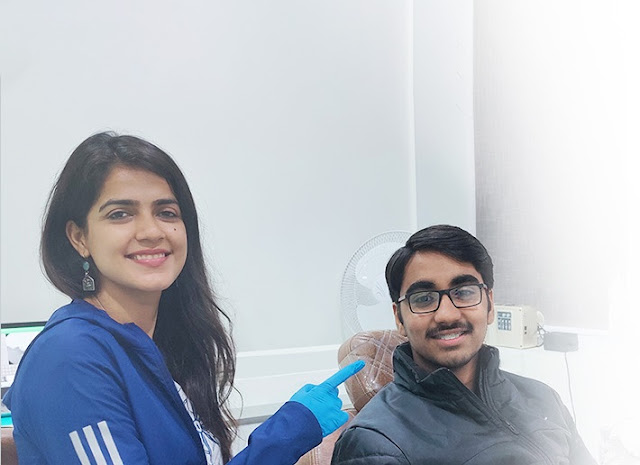Bite Problems That Can Develop In Child Teeth
Your child may grow their teeth between 6 to 8 months. As it is a long process, it begins with their lower central incisors and progresses till the age of three, when they have molars. The mystery of teeth development doesn't stop there. Between the ages of 6 and 8, your baby's primary teeth (often known as milk teeth) will begin to loosen as they permanently start to grow. By 13, your child should have all of their permanent teeth. Moreover last but not least, teens will usually notice their wisdom teeth appear by the age of 17, but it is also to be noted that only some people may develop wisdom teeth till this age
Through this process, your child will also develop their jaw and facial bones between the ages of 4 and 6. During this period, your child will develop their 'bite,' vital in chewing. On the other hand, if your child develops any bite issues, it leads to malocclusion. To overcome the bite problem, you may end your orthodontist research at Dr. Ravneet Kaur. She is the most preferred orthodontist among kids and is recognized as the best dentist for children in Gurgaon. In this article, we will try to decode the bite problems that can develop in a child's health with her help, so let's start!
Causes Of Bite Issues?
Mainly, bite issues occur due to inherited conditions, but there are other factors too that can lead to bite issues, such as:
- Thumb sucking
- Cleft lip and palate
- Effect of bottle-feeding
- Pacifier use at the age of 3
- Impacted teeth
- Abnormally shaped teeth
- Injuries causing jaw misalignment
- Tumours in the mouth or jaw
- Mouth breathing due to allergies
Bite Problems To Look Out For In Your Child's Teeth
Following are some of the common bite problems for which you should take your kid to the orthodontist, and these are:
- Excessive Spacing: In normal circumstances, your baby's permanent teeth erupt next to each other without noticeable space. Excessive spacing occurs due to the size difference between the jaw and teeth, missing teeth, abnormal gum tissue, or tiny teeth. Moreover, spacing problems may lead to several issues, including overexposure to eating, gums, and self-consciousness about how you appear when you smile.
- Underbite or Deep Bite: Generally, the top teeth slightly overlap the bottom teeth. But in an underbite or deepbite condition, the lower teeth sit in front of the upper jaw. If, in any case, a deep bite is not corrected, it can give your kid a 'bulldog' appearance and stress the jaw joints.
- Open Bite: We humans have two types of bite problems. The first can be identified as an anterior open bite, which only occurs when the back teeth remain in the same position and the front teeth do not overlap. The second one is the posterior open bite, which results when the front teeth lock but the back teeth set free. An open bite leads to swallowing and possible speech problems if not corrected on time.
- Crossbites: This type of tooth misalignment occurs when your teeth do not align with each other as they are supposed to. Crossbites can also occur due to misalignment of the bone and teeth. They can be on either one tooth or a set of teeth. If you do not consult an orthodontist for your kid, chances are high that this dental problem can cause the jaw to shift on one side and wear out the teeth.
- Misalignments and Abnormal Eruptions: Portrusions and retrusion are also calculated to be the most common bite problems. Protrusions usually occur when the upper jaw or teeth move too forward. Retrusions cause the lower jaw or teeth to appear too far back.
If you notice any of these bite issues in your child, it is better if you consult an orthodontist in Gurgaon or your nearby location to plan the treatment most effectively.
Is There Any Solution To Treat Bite Problems?
So what if your kid is dealing with bite issues? It's not like the end of the world; the medical treatments for bite problems can be:
Braces can fix an overbite or underbite issue. Overbite usually occurs when upper teeth extend past lower teeth, while underbites happen when lower teeth grow past upper teeth. Though many children are born with this condition, it can also be caused by thumb-sucking or other bad habits. Long in short, braces can fix your child's bite issues and prevent any future dental concerns that may arise.
Types of Braces Your Child Can Get
- Lingual Braces- Lingual braces are fixed on the inner side of the teeth, hidden from view. These braces work for any age with healthy gums. Though initial discomfort and speech challenges may occur, they can be improved with time.
- Conventional Metal Braces- Metal braces can be customized with colors. They consist of stainless steel brackets and archwires, gently moving teeth into their place by applying pressure for the desired bite. They are also a common choice for orthodontic treatment.
- Damon Braces- Damon braces use a self-ligating system, meaning brackets hold the wire without additional bands or ties. This design can reduce discomfort and offer more discreet treatment, requiring fewer dental visits.
- Ceramic Braces- These are also called clear braces and are made of tooth-colored material. They are more budget-friendly and an alternative to aligners.
Benefits of Using Braces
Other than solving bite issues, braces can also help in
- Improving overall oral health
- Boost one's self-esteem
- Prevent gum disease
- Avoid tooth decay
- Prevents bone erosion
Conclusion
If you notice any bite problem in your child, correct it and improve. As most bite issues worsen, you must take your child to the top orthodontist to plan the treatment effectively.
You can consult your child with Dr. Ravneet Kaur at Smiles by Dr. Ravneet Dental Clinic. She has over 15 years of experience and a proven success record, and she is renowned as the best dentist for children in Delhi and nearby areas. You can book an appointment with Dr. Ravneet Kaur by visiting Smiles by Dr. Ravneet Dental Clinic today, so book now!
Read More:




Comments
Post a Comment